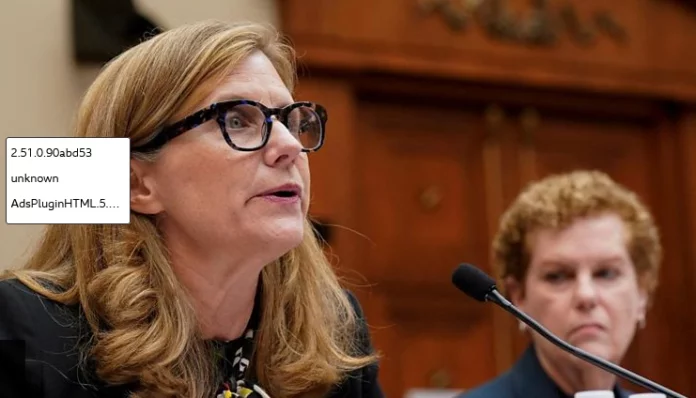The head of the University of Pennsylvania has quit because people were upset about what she said to Congress about antisemitism at the school. Her remarks made the already divided atmosphere at one of America’s oldest colleges more intense.
Noah Rubin is a Jewish student at Penn who, like many others, asked Elizabeth Magill to resign.
He says he’s been feeling uncomfortable at his school in Philadelphia since the 7 October attacks in Israel by Hamas.
He is the co-President of the Penn Israel Public Affairs Committee. He proudly wears his bright blue skullcap, but says it’s a decision he makes each day whether to keep showing his faith in that way.
He was very upset by a protest last week where some students were chanting “Intifada”. This term is used to describe violent Palestinian uprisings, but many Palestinians and their supporters see it as a call to end the occupation.
He said the protesters were chanting “From the river to the sea, Palestine will be free” which refers to the River Jordan and the Mediterranean Sea.
Many Jews, like Noah, think this means the Israeli state will be destroyed as it is now, but pro-Palestinian activists disagree and say it means the Palestinians deserve freedom and fairness.
During the meeting, Ms. Magill was asked if urging the killing of Jews went against the school’s rules against bullying and harassment. She said that it depends on the situation.
Ms Magill said sorry afterwards, she was concentrated on the university’s rules that say speech alone is not against the law. Harvard’s President Claudine Gay said sorry too.
Noah was not satisfied with Ms Magill’s answer. “Her apology is really bad,” he said in an interview on Friday before she stepped down. “Why didn’t she say it when she promised to tell the truth in front of many people. ”
The leaders of the University of Pennsylvania have been struggling with big disagreements over the Israel-Gaza war since it started. Students and teachers with different opinions about the conflict say that they have been attacked and judged for their views.
Ms Magill’s comments have made people look more closely at the university’s rules about free speech. For many years, it has followed the First Amendment, which keeps speech free. The US Constitution does not protect threats that are intended to harm someone physically.
Penn, being a private university, doesn’t have to follow the same First Amendment rules as a public school. However, since the university receives some money from the government, it may have been worried about getting in trouble if it was found to have not respected students’ freedom of speech.
Many people think that Ms. Magill made a mistake by acting as if her congressional hearing was a court trial, instead of using it as a chance to clearly explain their moral beliefs about a simple question.
Some people have a different opinion. The Foundation for Individual Rights and Expression, a group that supports free speech, said that it disagreed with her comments but believes that the solution is to stop all censorship instead of making it worse.
Mia Antonacci, who is 20 years old, is part of the group’s program for students at the campus. She is a Jewish woman and she feels unsure about how she feels.
“I know that from a legal perspective, this speech is allowed. We should also welcome speech that makes us uncomfortable and questions our beliefs,” she says. “What she said made me, my friends, and many people in the community feel uneasy. ”
The university is being looked at by the government to see how they are dealing with antisemitism.
Hillah Kohen, a student studying for a PhD, was at the hearing. She is from Israel and America, and she supports the rights of Palestinians. She does not agree with how Israel’s military is handling the situation in Gaza. The 27-year-old said that Ms. Magill’s answer was not good, and also said that the Republican Elise Stefanik was trying to take advantage of the situation.
Hillah’s great-grandparents died in a place called Auschwitz. She is worried about people who want to cause problems between different groups of people, both at school and outside of school.
“When we see hateful words and symbols on the walls, we need to come together as Jewish students to talk about how we can all stay safe on campus – both Jewish and Palestinian students. Our safety and freedom are connected. ”
An Arab medical student, who we will call Sayyid, asked to keep his name a secret because he is worried about getting in trouble for speaking up. He said to the BBC that he was unhappy with Elizabeth Magill, but understood that she was being pressured from all sides since the war started.
Still, Sayyid said that people who support Palestine don’t have as much power on college campuses as people who support Israel. The president kept criticizing Hamas. However, many students felt that the college should have spoken up more about the many civilian deaths in Gaza.
“Sayyid told the media that the university’s administration is more focused on one side because it is connected to donations. ”
Shortly after the president spoke in front of Congress, a big supporter took back a $100 million grant. They said they were shocked by what she said. A little more than a day later and Ms Magill had left.
Her decision to leave will not stop the intense argument about the Israel-Gaza war at the University of Pennsylvania and other US colleges.
But when we spoke to students this week, they all agreed that the president didn’t do a good job in handling the hearing. This rare unity was a reaction to her comments.
“Sayyid says that even though she may have meant to show both viewpoints, what she said at the hearing was not okay and seemed like it was against Jewish people. ” “I know why students were upset. “
